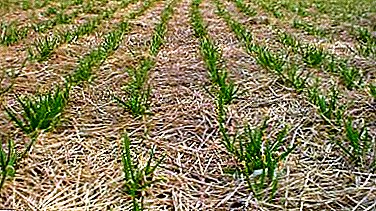
During breastfeeding, it is important to follow the diet, since all substances absorbed in the process of digestion pass into the milk of a nursing mother. Meals should be balanced. A lack of certain vitamins and minerals can lead to infant avitaminosis, while an overabundance often leads to allergies.
Vegetables and fruits with a red color are limited in the diet of a nursing mother, since such products contain allergens that some newborns are sensitive to. You can only check how much the child is prone to allergies by experimentally, using allergenic foods in the diet with caution.
Orange root crop as a risk factor for HB
The root crop is rich in vitamins, for example, it contains:
- vitamins C, B1, B2;
- nicotinic acid, pantothenic acid;
- salts of magnesium, calcium, sodium, manganese, phosphorus.
Also, the fruit is rich in biologically active substances, of which carotene is responsible for the characteristic orange pigment. And since it contains a maximum amount in carrots (four times more than in a tomato), it is the excess of this substance that negatively affects the health of the mother and baby. The consequences of overdose are allergies and carotenemia.
The benefits and harms of the product
Regular consumption of fresh carrots has a general tonic effect on the body., especially beneficial for water-salt balance, metabolism, elimination of toxins, slags and carcinogens, increased immunity, regenerative abilities of skin cells. For nursing mothers accentuates the lactogonic property of carrots: the root vegetable stimulates the production of breast milk.
 Carrots are particularly useful substance pigment. Beta-carotene has a comprehensive effect on the body.
Carrots are particularly useful substance pigment. Beta-carotene has a comprehensive effect on the body.
- Immunity. Due to its immunostimulating and wound healing properties, it is a preventive measure against cancer diseases. In the presence of such diseases significantly slows down the division of tumor cells.
- The cardiovascular system. It lowers blood cholesterol, normalizes blood pressure, restores the elasticity of blood vessels and the integrity of the capillaries. Due to this, blood circulation in the brain is stimulated, which reduces the risk of stroke and prevents the occurrence of varicose veins. Normalizes blood sugar levels.
- Digestion. Removes harmful substances from the body, helps peristalsis, restores the intestinal microflora.
- Vision. It improves visual acuity, prevents eye diseases, prevents corneal clouding. In the presence of glaucoma or cataracts, it slows down their development.
- Bone system. Keratin strengthens bone tissue, prevents diseases associated with the thinning of bones.
- Cosmetology. Necessary to restore the health of hair and skin. Beta-carotene is involved in the regeneration of the dermis and protection from the harmful effects of ultraviolet radiation. It is also useful for teeth and gums, prevents inflammation of the mucous membrane and strengthens enamel. Participation in carbohydrate metabolism will help keep the shape in shape, preventing the deposition of excess fat.
- Vitamin A production. Receipt of beta-carotene is the first step in obtaining vitamin A, because this substance is called provitamin, the precursor. If necessary, it is processed by the body into vitamin A. Its regular entry into the body is vital, since this provitamin is only found in plant tissues, the body itself cannot synthesize it.
Beta-carotene (provitamin A) and retinol (vitamin A) are two different substances!
Contraindications to the use of beta-carotene, unlike retinol, practically does not exist, because overdose with provitamin A is impossible. In the process of processing of the 13 molecules of beta-carotene 12 will be directed to the target use, and only one will be deposited in the liver and fatty layer of the epidermis for subsequent conversion.
But the simultaneous reception of a sufficient amount of beta-carotene-containing products and synthesized vitamin A can lead to serious consequences of overdose. Among them are the positive qualities brought to the minus sign. This is brittle bones, dryness and irritation of the skin, hair loss, weakening of the teeth.
The greatest danger of an overdose of retinol during pregnancy, as retinol, engaging in close interaction with DNA proteins, disrupts their sequence, leading to miscarriages and irreversible genetic changes in the fetus.
Contraindications
 But still there is a risk group limited in the use of this largely medicinal root crop:
But still there is a risk group limited in the use of this largely medicinal root crop:
- This includes smokers, because in combination with nicotine, beta-carotene processed into vitamin A is a direct threat of lung cancer.
- Care should be taken root in the period of acute gastric ulcer and duodenal ulcer.
- Also, carrots are contraindicated for people with individual intolerance.
Can a nursing mother eat a raw, boiled and roasted carrot?
Diet restriction during lactation is a standard medical practice based on identifying the sensitivity of the newborn to various foods. If possible, allergenic products are excluded or limited, among which is carrot due to its high pigmentation.
Is it possible to eat carrots in the first months of HB? Root crop should be introduced into the mother's food gradually and in small dosages.especially in the first month after birth. Nutritionists recommend eating no more than 250-300 grams of carrots per day, this will be enough to get the necessary portion of vitamins, and this amount is not critical for the occurrence of allergies. Raw carrots are found in the diet not earlier than six months from the date of delivery.
Beta-carotene refers to fat-soluble and thermo-resistant substances. When added to carrots fat like sour cream and vegetable oil, it will be absorbed better. With thermal processing - cooking or frying - its amount will decrease.
Eating boiled carrots in the form of a side dish is allowed from the first days of breastfeeding. If the carrot is stewed, the three hundred grams limit is valid.
Mothers in the first month of feeding should completely abandon carrot juice. In addition to beta-carotene saturation, this drink is rich in ascorbic acid, which is also allergenic.
Consequences of redundancy and lack of beta-carotene and vitamin A
With a constant consumption of carrots more than normal, the mother's body is saturated with beta-carotene. In this case, the pigmentation of the skin is disturbed and hypercarotemia appears. This disease is not dangerous and non-infectious. Symptoms of an overdose of beta-carotene - yellowing of the skin, especially around the palms, elbows and feet. The indications are similar to jaundice, hepatitis A, therefore, if they are available, you should consult a doctor for a diagnosis.
Deficiency in vitamin A, produced from beta-carotene, is characterized by mother's "night blindness", deterioration in the quality of vision during twilight and evening hours. Of the indicators can also be distinguished by brittle nails and hair, dry skin. For a child, the lack of beta-carotene and retinol is much more dangerous and is expressed in slowing growth. If beta-carotene is lacking in breast milk, it will be difficult in the future to fill it in the baby’s body.
During the period of feeding with the continuation of breastfeeding carrots in the form of puree is introduced into the diet not earlier than the seventh month, that is, after the introduction of the apple. Root juice is introduced a little later, diluted in a ratio of one to one with boiled water. The rate of vitamin A for children up to six months - 400 mg., At the age of from seven to twelve - 500 mg. At increase in parameter over 600 mkg. retinol becomes toxic to the baby.
Fresh Vegetable Recipes
In addition to boiled and roasted carrots, nutritionists recommend introducing root vegetable salads and vegetable juices in the menu of a nursing mother from the second month of a baby’s life.
Nutritious Cocktail
Ingredients:
- 1 large carrot;
- 1 banana (not overripe);
- 1 green apple.
Cooking and drinking:
- Apple pre-peeled.
- Fruits and vegetables cut and mix in a blender, if necessary, add 100 ml. water. or drinking yogurt.

Light salad
Ingredients:
- 2 carrots;
- 1 green apple;
- 2 cucumbers;
- 1 tbsp. olive oil.
Cooking and drinking:
- Pre-clean the apple.
- Grate the carrots and apples and chop the cucumber into thin slices.
- Season the salad with olive oil.

Such dishes for mom perfectly replace afternoon tea and will not cause allergies and intestinal disorders of the child.
Allergies in a child - how to manifest and what to do?
At the wrong use of a root vegetable mum or wrong introduction to a supplement the baby may have an allergic diathesis. His symptoms are:
- redness of the skin;
- red watery eruptions localized to the cheeks of the infant;
- inflammation around the eyes, conjunctivitis;
- swelling of the gums.
At the first sign, a possible allergen should be removed from the diet in order to avoid the occurrence of anaphylactic shock and consult a doctor. After testing, the allergist will identify the cause of the disease and prescribe medications.
Eating carrots serves to prevent diseases of the immune, digestive, cardiovascular systems, its presence in the diet is necessarily within acceptable limits. When breastfeeding should not abandon the root. Adjusting the diet of a nursing mother will help avoid overdose and allergies.












